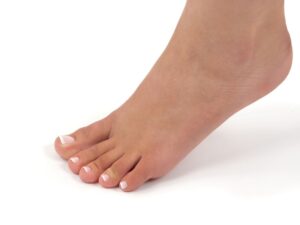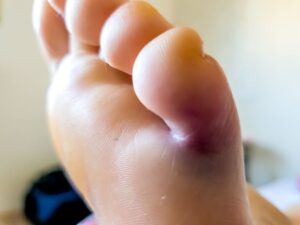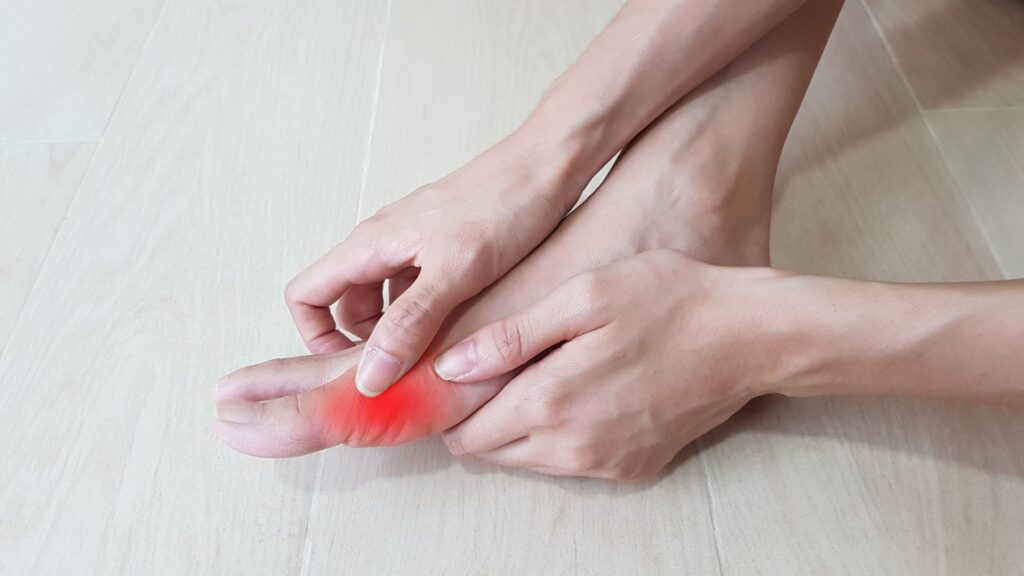About
Anatomy of the Toe and Dynamics of Injury

Did you know that the human foot is an incredible architectural marvel? Comprising 26 bones, 33 joints, and over a whopping 100 muscles, tendons, and ligaments, it’s truly a fascinating structure.
Now, let’s zoom in on the toes. Each toe (excluding the big toe) boasts three phalanges, or bones, while the big toe has just two. Toe fractures can strike any of these bones, and the culprits are often direct trauma or a sudden force.
In Jane’s adrenaline-charged encounter with the table, the sheer impact of her foot colliding with the furniture was more than enough to result in a fracture.
Types of Toe Fractures
Toe fractures come in various forms, depending on the location and severity of the injury. Some common types include:
-
Avulsion fracture: Occurs when a small piece of bone is pulled away by a ligament or tendon, often caused by an abrupt force or twisting motion.
-
Displaced fracture: The bone fragments are misaligned and require realignment for proper healing.
-
Open fracture: The broken bone hasthe skin, increasing the risk of infection.
-
Stress fracture: A hairline crack in the bone caused by repetitive stress or overuse, often seen in athletes.
In Jane’s case, she sustained a displaced fracture in her distal phalanx, the bone located at the tip of her toe.
Diagnosis
Symptoms and Signs of a Toe Fracture
When a toe fracture occurs, some common symptoms include

- Intense pain and swelling
- Bruising or discoloration
- Difficulty moving the toe or walking
- Deformity or misalignment of the toe
Jane experienced pain, swelling, and difficulty walking, prompting her to seek medical attention at Urgent Care Brisbane.
Examination and X-Ray
During her visit, Jane’s toe was thoroughly examined by a healthcare professional. The examination included checking for any deformities, assessing her range of motion, and evaluating her pain levels. To confirm the diagnosis, an X-ray was performed, revealing the displaced fracture in her distal phalanx.
For further information on the importance of X-rays in fracture diagnosis, visit this Cleveland Clinic article.
Treatment
Management and Complications
There are several treatment options available for toe fractures, depending on the type and severity of the injury. In Jane’s case, her displaced fracture required proper realignment, or closed reduction, to ensure proper healing. Once the bone fragments were aligned, her toe was buddy-taped to the adjacent toe for stability.
Other potential treatments include:
- Wearing stiff-soled shoes to protect the injured toe
- Using crutches to avoid putting weight on the affected foot
- Applying ice and elevating the foot to reduce swelling
- Taking over-the-counter pain relievers for pain management
For more details on fracture management, check out this Healthline article.
Complications of toe fractures can include long-term pain, stiffness, arthritis, or even infection in the case of an open fracture. Prompt and appropriate treatment is crucial to minimize these risks.
How Urgent Care Brisbane Can Help
Urgent Care Brisbane offers a comprehensive approach to managing toe fractures without the need for a hospital emergency visit. Their services include:
- On-site radiology: X-rays are performed in-house to quickly diagnose fractures and determine the appropriate treatment.
- Closed reduction: If necessary, skilled practitioners can realign displaced fractures without surgery.
- Casting: Synthetic casts can be applied to immobilize the affected area and promote proper healing.
- Follow-up care: Patients receive ongoing care and monitoring to ensure optimal recovery.
- Support equipment: Moon boots and crutches are available to help patients maintain mobility while protecting the injured toe.
For more information on how Urgent Care Brisbane can help with toe fractures, visit their website.
In conclusion, understanding the anatomy, mechanism of injury, types of fractures, symptoms, and treatments for toe fractures is essential for proper healing and avoiding long-term complications. By seeking prompt medical attention and following the recommended treatment plan, patients like Jane can expect a full recovery and return to their normal activities.
Next Steps
Visit Urgent Care for Expert Care and Treatment
If you suspect a toe fracture, it’s important to seek medical attention as soon as possible to ensure proper diagnosis and treatment. Urgent Care Brisbane is equipped to handle toe fractures and other orthopedic injuries, providing high-quality care without the long wait times associated with hospital emergency rooms.
Don’t hesitate to take the necessary steps towards recovery. Visit Urgent Care Brisbane for expert care and management of your toe fracture. Your path to healing starts now.

